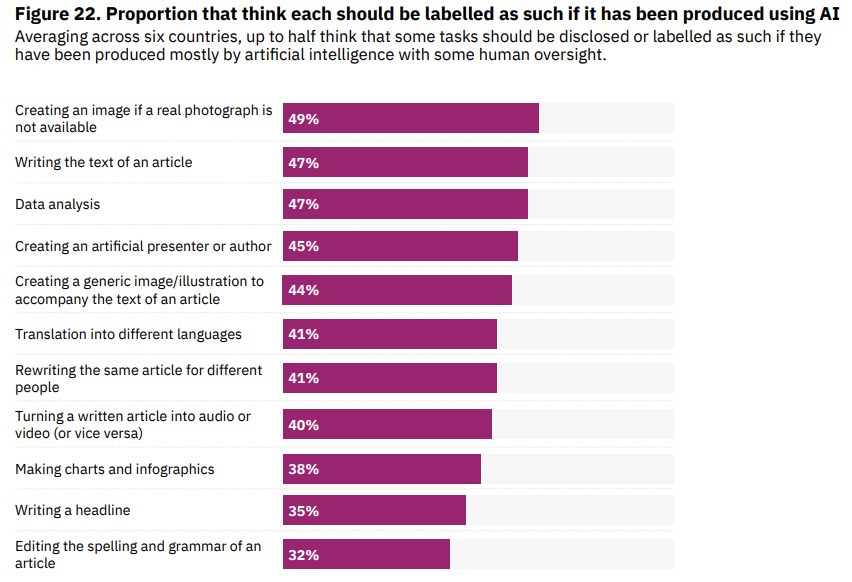I’ve written extensively about AI use in newsrooms and across other publishing departments, but a recent study from Reuters Institute for the Study of Journalism (RISJ) at the University of Oxford takes a look at the other side: specifically, how the news-consuming public sees that AI use.
“People are generally more comfortable with news produced by human journalists than by AI,” the study, titled What Does the Public in Six Countries Think of Generative AI in News?, says. “Although people are generally wary, there is somewhat more comfort with using news produced mostly by AI with some human oversight when it comes to soft news topics like fashion (+7 percentage point difference between comfortable and uncomfortable) and sport (+5) than with ‘hard’ news topics, including international affairs (-21) and, especially, politics (-33).”
The survey, conducted by YouGov by sampling more than 2,000 people from the United States as well as 2,000-plus from each of five other countries in March and April, found that the “vast majority” believe that AI-produced news with human oversight should have a label or some disclosure.

(Source: Reuters Institute for the Study of Journalism at the University of Oxford)
Overall, more than a third of global respondents think that journalists already use generative AI, either “always” or “often,” for such tasks as editing and spelling (43%), translating (43%), data analysis (40%), and making charts or infographics (38%). 27% believe journalists always or often use genAI for writing article text.
“The results may also reveal a degree of cynicism about journalism from some parts of the public,” the study says. “However unwelcome they might be — and however wrong they are about how many news media use AI — these perceptions are a social reality, shaping how parts of the public think about the intersection between journalism and AI.”
35% of those surveyed said they were comfortable with news being produced entirely by AI or mostly by AI with some human oversight. In terms of news consumption, 10% of those in the United States had used generative AI to get the latest news, much higher than the 5% average across the six surveyed countries.
“The 10% figure … is probably partly due to the fact that Google has been trialing Search Generative Experiences (SGE) there for the last year,” the study says about the data, crunched even before Google introduced its much-maligned AI Overviews. “Meaning that people who use Google to search for a news-related topic — something that 23% of Americans do each week — may see some generative AI text that attempts to provide an answer.”
RISJ’s research was not the only recent study about news consumers and their AI proclivities. A SmartNews poll shared by MediaPost found that 47% trust AI for news and information, a number up from 46% earlier in the year and 41% in October 2023. “To earn the trust of Americans, tech companies using AI need to work with high-quality publishers to ensure the AI news content they produce is accurate and authentic,” says Ben Leiner, head of product marketing and research at SmartNews. “Otherwise, they risk further eroding readers’ trust in the news and destabilizing the information ecosystem.”
The RISJ study found that only 8% think AI-produced news would be more valuable and worth paying for than human-produced news, with a general belief it would be less trustworthy and less transparent. Its on-balance net positives would be that it would be more up-to-date and cheaper to make.
“We find that the public primarily think that the use of generative AI in news production will help publishers cut costs, but identify few, if any, ways in which they expect it to help them as audiences, and several key areas where many expect news made with AI to be worse,” the study says.
So, as you use AI — as well as consider how others are using it — what do you think of its potential (and problems) in the newsroom? From all indications, it’s a self-reflection that’s long overdue.
SEE FOR YOURSELF
The Magazine Manager is a web-based CRM solution designed to help digital and print publishers manage sales, production, and marketing in a centralized platform.





